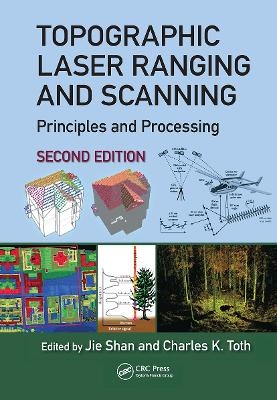
Topographic Laser Ranging and Scanning
CRC Press (Verlag)
978-1-032-47629-2 (ISBN)
Topographic Laser Ranging and Scanning, Second Edition, provides a comprehensive discussion of topographic LiDAR principles, systems, data acquisition, and data processing techniques. This edition presents an introduction and summary of various LiDAR systems and their principles and addresses the operational principles of the different components and ranging methods of LiDAR systems. It discusses the subsequent geometric processing of LiDAR data, with particular attention to quality, accuracy, and meeting standards and addresses the theories and practices of information extraction from LiDAR data, including terrain surface generation, forest inventory, orthoimage generation, building reconstruction, and road extraction.
Written by leaders in the field, this comprehensive compilation is a must-have reference book for senior undergraduate and graduate students majoring or working in diverse disciplines, such as geomatics, geodesy, natural resources, urban planning, computer vision, and computer graphics. It is also vital resource for researchers who are interested in developing new methods and need in-depth knowledge of laser scanning and data processing and other professionals may gain the same from the broad topics addressed in this book.
New in the Second Edition:
A comprehensive array of new laser ranging and scanning technologies.
Developments in LiDAR data format and processing techniques.
Regrouping of surface modeling, representations and reconstruction.
Enhanced discussions on the principles and fundamentals beyond small-footprint pulsed laser systems and new application examples.
Many new examples and illustrations.
Jie Shan received his PhD in photogrammetry and remote sensing from Wuhan University, China. Since then he has worked as faculty at universities in China, Sweden, and the United States, and has been a research fellow in Germany. Currently, he is an associate professor in geomatics engineering at the school of Civil Engineering of Purdue University, West Lafayette, Indiana, where he teaches subjects in photogrammetry and remote sensing, and geospatial information science and technology. His research interests are digital mapping, geospatial data mining, and urban modeling. He is a recipient of multiple academic awards and author/coauthor of over 100 scientific papers. Charles K. Toth has PhDs in electrical engineering and geoinformation science from the University of Budapest, Budapest, Hungary, and is currently a senior research scientist with the Ohio State University Center for Mapping. His research expertise covers broad areas of 2D/3D signal processing, spatial information systems, airborne imaging, surface extraction and modeling, integrating and calibrating of multisensor systems, multisensory geospatial data acquisition systems, and mobile mapping technology. His references are represented by over 150 scientific/technical papers.
Preface to the Second Edition. Preface to the First Edition. Editors. Contributors. Introduction to Laser Ranging, Profiling, and Scanning. Terrestrial Laser Scanners. Airborne and Spaceborne Laser Profilers and Scanners.LiDAR Systems and Calibration. Pulsed Laser Altimeter Ranging Techniques and Implications for Terrain Mapping. Georeferencing Component of LiDAR Systems. Full-Waveform Analysis for Pulsed Laser Systems. Strip Adjustment. Accuracy, Quality Assurance, and Quality Control of Light Detection and Ranging Mapping. Data Management of Light Detection and Ranging. LiDAR Data Filtering and Digital Terrain Model Generation. Forest Inventory Using Laser Scanning. Integration of LiDAR and Photogrammetric Data: Triangulation and Orthorectification. Feature Extraction from Light Detection and Ranging Data in Urban Areas. Global Solutions to Building Segmentation and Reconstruction. Building and Road Extraction from LiDAR Data. Progressive Modeling of 3D Building Rooftops from Airborne LiDAR and Imagery. A Framework for Automated Construction of Building Models from Airborne LiDAR Measurements. Quality of Buildings Extracted from Airborne Laser Scanning Data—Results of an Empirical Investigation on 3D Building Reconstruction. Index.
| Erscheinungsdatum | 11.01.2023 |
|---|---|
| Zusatzinfo | 97 Illustrations, color; 459 Illustrations, black and white |
| Verlagsort | London |
| Sprache | englisch |
| Maße | 178 x 254 mm |
| Gewicht | 1480 g |
| Themenwelt | Naturwissenschaften ► Geowissenschaften ► Geografie / Kartografie |
| Naturwissenschaften ► Physik / Astronomie ► Optik | |
| Technik ► Elektrotechnik / Energietechnik | |
| Technik ► Umwelttechnik / Biotechnologie | |
| ISBN-10 | 1-032-47629-X / 103247629X |
| ISBN-13 | 978-1-032-47629-2 / 9781032476292 |
| Zustand | Neuware |
| Haben Sie eine Frage zum Produkt? |
aus dem Bereich


